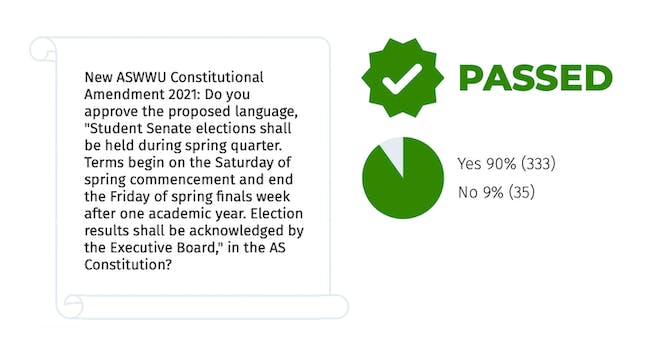Students divided on if spring or fall elections are most ideal for current and transfer students

By Alison Ward
Current Western Washington University students will now be able to run in student senate elections in the spring after passing a new Associated Students WWU constitutional amendment.
In previous years, student senate elections were held during fall quarter, with terms beginning after election certification and ending the Friday of spring finals week in the same academic year, according to the ASWWU constitution. Student senate elections will now line up with the executive board election time in the spring.
The amendment was suggested to be put into action by conversations second-year AS Senate Pro-Tempore Sargun Handa had with her predecessors. Handa said this referendum was something she was tasked with, along with seeking the students perspective on it.
“This change directly affects the Western community in a positive way because more can be done because we have a longer term to get more change enacted — for instance, the Black Student Organization demands,” said Liz Rosales, a fourth-year AS Woodring student senator.
To include more candidates in the running for student senate elections, AS leadership felt the pros outweigh the cons when moving student senate elections to spring, according to a statement by Handa.
Holding spring elections means the senate will sit as equals with the executive board. The AS only gets six months of work time, which isn’t a lot of time to get things moving with how slowly the university moves to make changes, Rosales said.
“Dozens of student senators have testified that they don’t feel adapted or situated in their positions until January [with elections in the fall],” Handa said. “As a result, we cannot make tangible changes until January to June, which is five months of change.”
Students on Instagram were quick to express their opinions about the amendment with comments and posts.
One of them was Rukhsar Sadat, a fourth-year Western student and previous student senator for the Fairhaven College of interdisciplinary studies for the 2019-2020 academic year.
“I am not in favor of senate elections transitioning to spring because I honestly do not see how this new referendum will be inclusive,” Sadat said. “We’ve got to talk about the power dynamics between the executive board and the senate and how they function.”
Sadat started a petition and wrote a statement to express her opposing views regarding student senate elections to the Associated Students of Western.
“This amendment helps everyone, all 16,000 students at Western, because everyone doesn’t have representation for five months and now they will have representation all year long,” Handa said.
Michael Miller, a higher education professor at the University of Arkansas, said Western’s new model isn’t unusual for a college because summer can serve as a transition time. It is typical for elections to be held in the spring, with summer being the transition time.
“Getting trained over the summer opens a lot of possibilities to start sitting on our committees as soon as the school year starts rather than not getting on the committees until February,” Rosales said.
Sadat also expressed concern that transfer students are traditionally from community colleges and other universities with two to three years already finished. They would then be a third or fourth-year at Western, resulting in transfer students having less time in the position.
Sadat said as a fourth-year student, juggling a part-time job and a full-time course load is already overwhelming, and being a senator would be a lot for a fourth-year student.
Incoming fall 2021 transfer student Angelica Odom said springtime would be best for elections because it gives students time to become acquainted with the school and their peers.
“Remember to reach out to your senators with changes you want to see because it's the students that make the change,” Rosales said.
Students can contact the AS and learn more about their duties and upcoming events on their website.
“Aside from financial responsibilities, the student government is the de facto voice of the student body,” Miller said. “When administration or even public policymakers want to know what students think or what they want, the student government is typically the first place that these individuals look, and that is a huge responsibility.”





